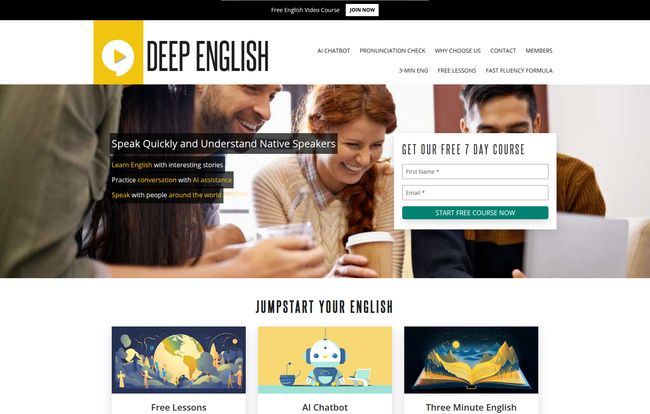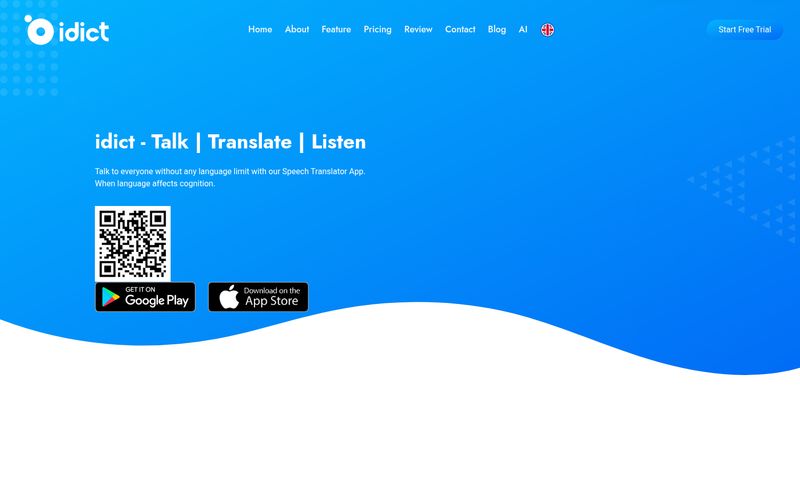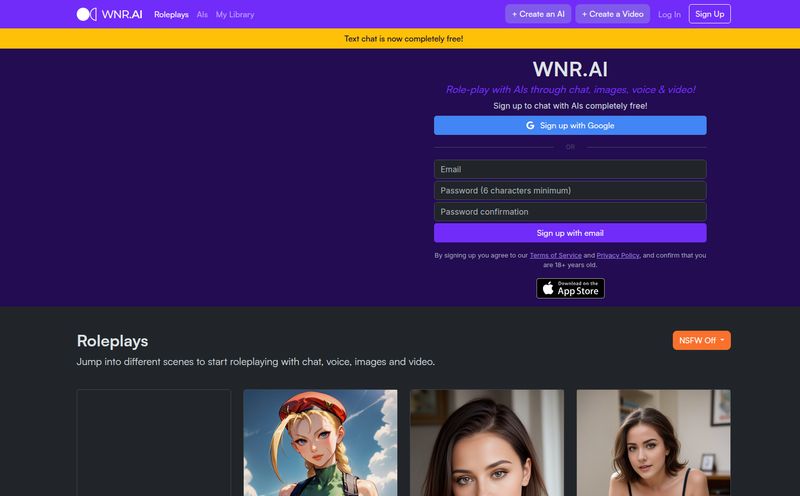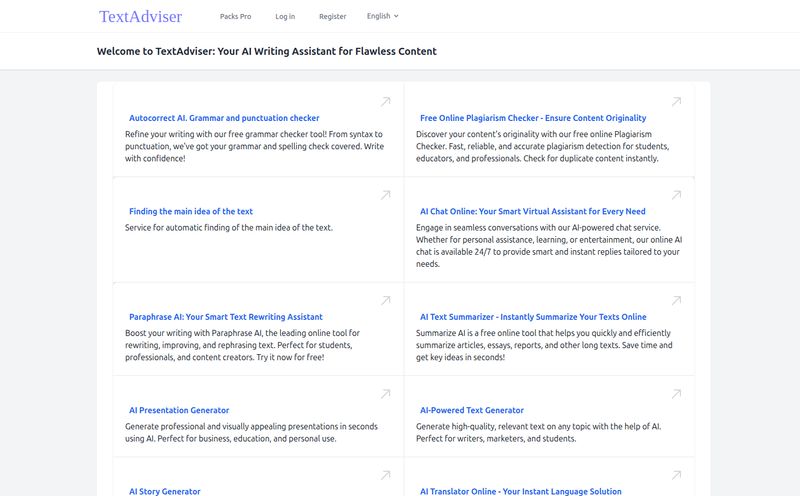We’ve all been there. You spend years learning English in a classroom. You can ace a grammar test, you know all the verb tenses, and you can probably read a news article without too much trouble. But then you’re in a real conversation—maybe on a Zoom call with a native speaker—and your brain just… freezes. All that knowledge flies out the window. It's the classic gap between knowing a language and using it.
For years, the online language learning space has been trying to solve this. We've had flashcard apps, gamified lessons, and a million YouTube tutors. And they're fine, I guess. But I’ve always felt something was missing. That bridge between passive learning and active speaking. So when I started hearing buzz about Deep English, a platform that claims to help you achieve fluency through stories and AI, my curiosity was definitely piqued. Is this just another app, or is it something different? I decided to dig in.
So, What Exactly is Deep English?
First off, Deep English isn't your typical vocabulary drill sergeant. It’s built on a pretty compelling idea: we learn best through stories. Think about it. It’s how we learned as kids. A good story gives context to new words, makes grammar feel natural instead of like a math problem, and is just plain more interesting. The platform combines these interactive, story-based lessons with some slick AI tools and—this is the important part—a community of real people to practice with.
It’s less like a textbook and more like a flight simulator for conversations. You’re not just memorizing the parts of the plane; you’re actually getting in the cockpit, first with a friendly AI co-pilot, and then with other real pilots in live sessions. It’s designed to build that muscle memory for speaking that you just can't get from a multiple-choice quiz.

Visit Deep English
The Core Features That Caught My Eye
Alright, let's get into the nuts and bolts. A platform is only as good as its features, and Deep English has a few that I think are genuinely smart.
Interactive Stories, Not Boring Drills
This is the heart of the platform. Instead of isolated sentences, you get stories. Lessons are built around narratives, which is a massive win for memory retention. There’s a ton of research out there, like the work done on narrative theory, showing that our brains are just wired for stories. It’s how we make sense of the world. Learning new idioms or phrasal verbs inside a story gives them an emotional hook, making them way easier to remember than a dry list on a page. It’s the difference between memorizing a recipe and actually cooking the meal.
Your Own Personal AI Chatbot and Tutor
Here’s where the 21st-century magic comes in. Deep English has an AI-integrated vocabulary trainer that adapts to you, plus an AI chatbot for conversation practice. This is huge. One of the biggest fears for learners is the fear of making mistakes in front of people. Well, an AI bot doesn’t judge. You can practice phrasing, try out new words, and get your thoughts in order without any pressure. It’s a safe space to fail, and failing is how you learn. This AI texting partner feels like a patient friend who’s available 24/7 to help you practice your conversational English.
The Human Element: Live Practice and a Real Community
But let's be honest, you can't learn to swim without getting in the water. AI is a great tool, but it's not a substitute for real human interaction. This is where I think Deep English really gets it right. The higher-tier plans include live speaking practice on Zoom with small groups. This is the crucial step. You take what you've learned from the stories and practiced with the AI, and then you apply it with real people. They also have a global community forum. Seeing testimonials from people in Romania, Puerto Rico, and Iran tells me this isn't just a US-centric thing; it’s a global meeting place, which is fantastic for getting exposure to different accents and perspectives.
Let's Talk Turkey: The Deep English Pricing Plans
Okay, the all-important question: what’s it going to cost? The pricing structure is tiered, which is pretty standard for a service like this. Here’s how it breaks down:
| Plan | Price | Key Features |
|---|---|---|
| Standard | $18 / month | Interactive Story Lessons, AI Vocabulary Trainer, AI Texting Partner. |
| Plus | $37 / month | Everything in Standard, plus a Fluency Focus Plan and Clear Speech Pronunciation Plan. |
| Premium | $49 / month | Everything in Plus, plus the Community Forum, Live Conversation Practice, and Personalized Teacher Support. |
In my opinion, the Standard plan is a great entry point to see if the story-based method works for you. The Plus plan seems like the sweet spot for self-motivated learners who want more structure. But the Premium plan... that’s the whole package. The live practice and personalized teacher support are the features that will most likely accelerate your progress from understanding English to speaking English confidently.
The Good, The Bad, and The Honest Truth
No tool is perfect, right? Here’s my no-fluff breakdown.
The Good Stuff: The comprehensive approach is a huge plus. It’s not just one thing; it’s a blend of engaging stories, smart AI, and real human connection. The lessons are genuinely interesting, which means you’re more likely to stick with it. And the personalized learning aspect, where the AI adapts to you, is a powerful feature for efficient study.
Where It Could Be Better: This isn't a magic pill. It requires you to show up and do the work consistently. If you’re looking for a passive, five-minute-a-day kind of app, this might feel a bit more involved. Also, some of the best features, like the live speaking sessions, are only in the permium plan. That's a pretty standard business model, but you need to be aware that the $49/month tier is where the full power of the platform is really felt.
Who Is Deep English Actually For?
After looking through everything, I have a pretty clear picture of who would get the most out of Deep English.
- The Intermediate Learner on a Plateau: You know the basics, but you feel stuck. You can't seem to make the leap to fluent, natural conversation. This is for you.
- The Shy Speaker: If the thought of speaking English makes you nervous, the combination of a non-judgmental AI and small, supportive group classes is a perfect way to build confidence.
- The Professional Needing Better Communication: If your career requires you to speak English in meetings and presentations, the focus on conversational fluency and native-like phrasing is invaluable.
Who is it not for? Probably not for absolute beginners. You'll need some foundational knowledge to get the most out of the stories. It’s also less focused on formal academic writing and more on spoken communication.
Frequently Asked Questions
- Is Deep English good for beginners?
- It's probably best for those who already have a basic understanding of English. It's designed to take you from an intermediate level to fluency, rather than starting from zero.
- How much time do I need to commit?
- Like anything worth doing, consistency is more important than intensity. Even 20-30 minutes a day will yield better results than cramming for hours once a week. The platform is designed for regular, engaging practice.
- Can I really become fluent with an app?
- Deep English is more than just an app; it's a system. The app/AI part is a tool to build your skills, but true fluency will come from combining that with the live practice sessions and active use. It gives you the tools and the opportunities, but you still have to walk the path.
- What's the main difference between the Plus and Premium plans?
- The biggest difference is the interactive human element. The Premium plan adds the live conversation practice with other students and personalized support from a teacher. Plus is more for structured self-study; Premium is for guided, interactive learning.
- Is there a free trial?
- Yes, Deep English offers a free 7-day course. It’s a great way to get a feel for their teaching style and see if the platform is a good fit for you before committing to a paid plan.
My Final Verdict on Deep English
So, is Deep English the real deal? In my book, yes. It's one of the most intelligently designed platforms I've seen for tackling the trickiest part of language learning: turning passive knowledge into active, confident speech. It smartly uses AI not to replace human connection, but to prepare you for it.
If you feel like you've hit a wall with your English and the traditional methods just aren't cutting it anymore, I genuinely think Deep English is worth a look. The best tool is always the one you actually enjoy using, and they seem to have cracked the code on making the learning process engaging and, dare I say, fun. Give the free 7-day course a shot. What have you got to lose?
Reference and Sources
- Deep English Official Website
- Deep English Pricing and Plans
- "The Cognitive Science of Storytelling" - Frontiers in Psychology - An interesting read on why our brains are so receptive to narrative structures.



